That is true, but here in LA relation with USA is more ideological driven, USA has pretty good relationships with right-wing politicians, either republican or democratic parties, but is more complicated with left-wing, especially for the historical blockade agains cuba, historical coups or sanctions against left-wing goverments (Hillary Clinton was behind coups in Honduras and Brazil) . You can see this with AMLO and Lula critics against weapons shipments to Ukranie.This is really getting embarrassing for Biden
AMLO is definitely out now. Pretty amazing considering he did not even ditch on Trump after all those terrible things Trump said about Mexico. The rest of this article does a pretty good job of explaining the grievances that Latin American countries have with America in recent years.
My experience has been that most of these countries are still very culturally connected to America, but have serious love/hate relationship with America from past meddling or perception of destroying their economy (in the case of Argentina).
You are using an out of date browser. It may not display this or other websites correctly.
You should upgrade or use an alternative browser.
You should upgrade or use an alternative browser.
South American Economics/China-Latin American Relations Thread
- Thread starter Strangelove
- Start date
Well, Bolsonaro was tight with Trump, but definitely hates Biden. I think US relationship with Brazil is shot unless Bolsonaro and Trump are in power at the same time. Colombia really depends on if Petro or Hernandez wins. I could see Petro leaning toward China if he wins. Keep in that far right don't always go against China. in the case of Hungry, Orban is actually very pro China.That is true, but here in LA relation with USA is more ideological driven, USA has pretty good relationships with right-wing politicians, either republican or democratic parties, but is more complicated with left-wing, especially for the historical blockade agains cuba, historical coups or sanctions against left-wing goverments (Hillary Clinton was behind coups in Honduras and Brazil) . You can see this with AMLO and Lula critics against weapons shipments to Ukranie.
Because Orban is first and foremost a nationalist and China is making big investments in HungaryKeep in that far right don't always go against China. in the case of Hungry, Orban is actually very pro China.
AssassinsMace
Lieutenant General
What's an economic alliance without more access to the US market? It's about the US controlling what members can do. Most alliances you just need 50% of the countries to force all members to comply. In the EU you can just have one country to veto like how the US was able to kill anything the EU wanted to do with China. That's why the US wants all these alliances. It's not about coordinating countries against China. It's about controlling countries to prevent them from doing business with China.
Of course, if you are China. You do not expect European/Latam countries to just like you because they share culture values with you. You expect to have better relationship with them through mutually beneficial economic relationship.Because Orban is first and foremost a nationalist and China is making big investments in Hungary
I was talking to a local in Mexico about their auto industry. He told me that in the past, they could not have their own domestic automaker because Washington would not allow it. That's why no country in Latin America has their own auto maker. They just have plants of foreign automakers. This really explains why countries like Brazil will probably really welcome BYD to come to their country and build factories. Again, Latin America needs to be looked at for auto industry investment by Chinese automakers. There is serious strategic implications here.
If you add in the offered technology transfer and PPP then the whole EV supply chain can be built in LatAm quite realistically.Of course, if you are China. You do not expect European/Latam countries to just like you because they share culture values with you. You expect to have better relationship with them through mutually beneficial economic relationship.
I was talking to a local in Mexico about their auto industry. He told me that in the past, they could not have their own domestic automaker because Washington would not allow it. That's why no country in Latin America has their own auto maker. They just have plants of foreign automakers. This really explains why countries like Brazil will probably really welcome BYD to come to their country and build factories. Again, Latin America needs to be looked at for auto industry investment by Chinese automakers. There is serious strategic implications here.
Any LatAm country is probably going to go nuts for a Gigafactory.
What China is really doing though is making a local market for those future products.
Agrigculture is the mainstay here, with increasingly online farming and logistics the way to pull the rural populations out of poverty.
These rural people are the millions of people that can then buy the BYD cars of the 2030’s, which could be made from parts sourced from a LatAm supply chain, using Chinese software.
@Andy1974 bro because now they have a choice and an alternative, before China is tentative trying not to offend the US as they shore up their strength at home and its sphere of influence BUT now the Chinese see an opportunity as the American falter due to their owned Hubris. Two can play the game as China implements its Pivot to Latin America strategy and bring the fight to America door step.If you add in the offered technology transfer and PPP then the whole EV supply chain can be built in LatAm quite realistically.
Any LatAm country is probably going to go nuts for a Gigafactory.
What China is really doing though is making a local market for those future products.
Agrigculture is the mainstay here, with increasingly online farming and logistics the way to pull the rural populations out of poverty.
These rural people are the millions of people that can then buy the BYD cars of the 2030’s, which could be made from parts sourced from a LatAm supply chain, using Chinese software.
Biden's ‘ambitious’ economic plan for Latin America offers a ‘social contract,’ not trade agreements
The proposals are unlikely to satisfy Latin American countries eager for more American trade access and investment.
But the president’s proposals, which mirror its approach to economic engagement in other regions of the world, are unlikely to satisfy the desire among Latin American countries for more trade access in the U.S. — and, among those that already have free trade agreements, for more economic engagement and investment, writ large.
Looks more and more like the IPEF that, at least for the short and intermediate term, offers little to help stimulate trade and economic growth for developing economies.
protectionism right now is very strong here in America. It's hard for Biden to open up trade access in the current environment.Looks more and more like the IPEF that, at least for the short and intermediate term, offers little to help stimulate trade and economic growth for developing economies.
They have so little to offer that AMLO didn't even bother to show up.
US initiative cannot match BRI in Latin America as countries welcome cooperation, not ideological confrontation
Latin America welcomes cooperation, not ideological confrontation: expert
By Published: Jun 08, 2022 09:48 PM
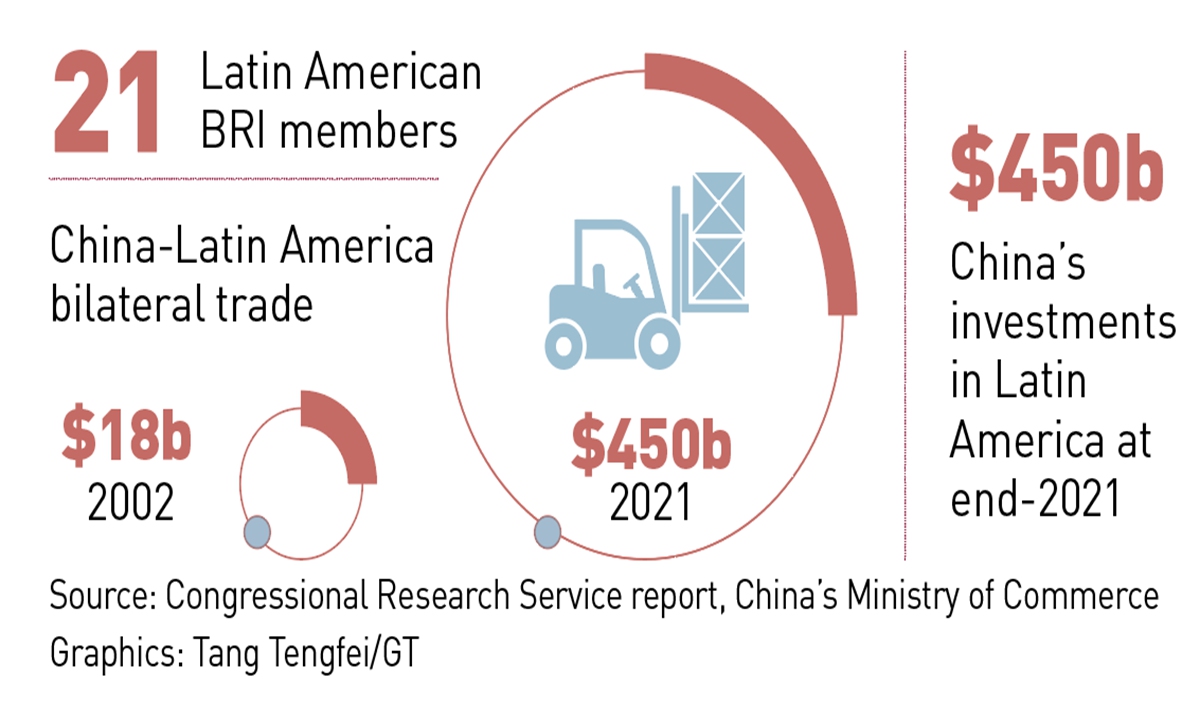
Photo: GT
The China-proposed Belt and Road Initiative (BRI) has made steady progress in Latin America during the past three years, which has brought concrete benefits to partner economies with its people centered approach, Chinese experts said on Wednesday.
Analysts said the growing influence of BRI in Latin America, while the US-led counterweight initiative Growth in the Americas achieved little, showed cooperation and inclusiveness have outmatched confrontation and divisiveness in the region.
The US is reportedly planning to unveil a new plan called "Americas Partnership for Economic Prosperity", something of an upgrade of the Trump-era Growth in the Americas initiative, which experts said imitates the BRI to vie for influence, at this week's Summit of the Americas in Los Angeles.
However, the US decision to exclude Cuba, Venezuela and Nicaragua from the summit has drawn criticism, and Mexico's president decided to skip the event.
Analysts said although the Growth in the Americas plan aims to promote private-sector investment in energy and infrastructure projects, the US lacks the necessary economic complementarity and has limited financing resources. The result: Growth in the Americas has failed to produce any tangible results in the past three years. Consequently, initial enthusiasm from Latin American countries has faded.
Despite the COVID-19 pandemic that weighed heavily on the global economy, the BRI still made concrete progress since 2020, with cooperation with Latin American countries to fight the coronavirus being an important feature.
The $1.52 billion Fourth Bridge over the Panama Canal and the $5 billion Bogota Metro Line 1 project in Colombia, two flagship projects of China Communications Construction Co (CCCC), a Chinese infrastructure giant known for building many BRI landmarks around the world, proceeded well despite the pandemic.
CCCC said in a statement sent to the Global Times on Wednesday that after decades of efforts in the South American market, the company's SDC dredging service has expanded to Brazil, Argentina, Uruguay and Panama and provided local customers with a low-cost alternative in a market previously dominated by European firms.
The company's dredging service for the Port of Paranagua, Brazil's second-largest port, ensured the port was a bright spot for exports in 2021, the company said.
In a statement sent to the Global Times on Wednesday, China Railway Construction Corp (CRCC) said that it is working on several major projects in Latin American countries.
In May, CRCC signed a construction contract for a new Demerara River Bridge in Guyana's capital Georgetown, increasing river traffic efficiency by 75 percent and road traffic by 100 percent.
The company is also working on a 195-kilometer section of Chile's No.5 Highway, which is to be Chile's first highway equipped with a fully automated toll system and one of the largest infrastructure projects in the country, as well as the Arima General Hospital, one of the largest and most advanced hospitals in Trinidad and Tobago.
These large projects undertaken by large Chinese state-owned companies are accompanied by a long list of Chinese private companies investing in Latin America.
Chinese investment in Latin America, which is China's second-largest overseas investment destination, stood at $450 billion as of end-2021 and accounted for 19 percent of total Chinese overseas direct investment, data from China's Ministry of Commerce showed.
In 2022, the influence of the BRI in Latin America has seen a sharp increase, with Nicaragua entering into an official document on BRI cooperation in January, followed by Argentina in February.
Song Junying, director of the Latin America and Caribbean Department at China Institute of International Studies, said engaging in massive infrastructure projects has never been the US' specialty, and the US government also lacks the financial power to make such things happen.
Analysts said the US having its own economic plan to cooperate with regional countries and some benign competition may help improve the quality of BRI projects, but if the US tries to stigmatize the BRI and attempts to force countries to choose sides, it is doomed to hit the wall as countries are fed up with attempts to politicize economic matters and to stir up ideological confrontations.
"The political climate between China and Latin American countries as well as highly complementary economic structures means that Latin American countries won't choose sides or join some exclusive clubs the US sets up to single out China," Song said.
In 2021, trade between China and Latin American countries exceeded $450 billion, reaching a new high and growing 40 percent from 2020.
Song said in the post-pandemic world, Latin American countries have a stronger resolve to determine their own development paths, no matter whether the US sees Latin America as its "backyard" or "front-yard."
Song said while a growing BRI focus is on projects that are small and beautiful, large infrastructure projects remain China's calling card, something which other players cannot provide.
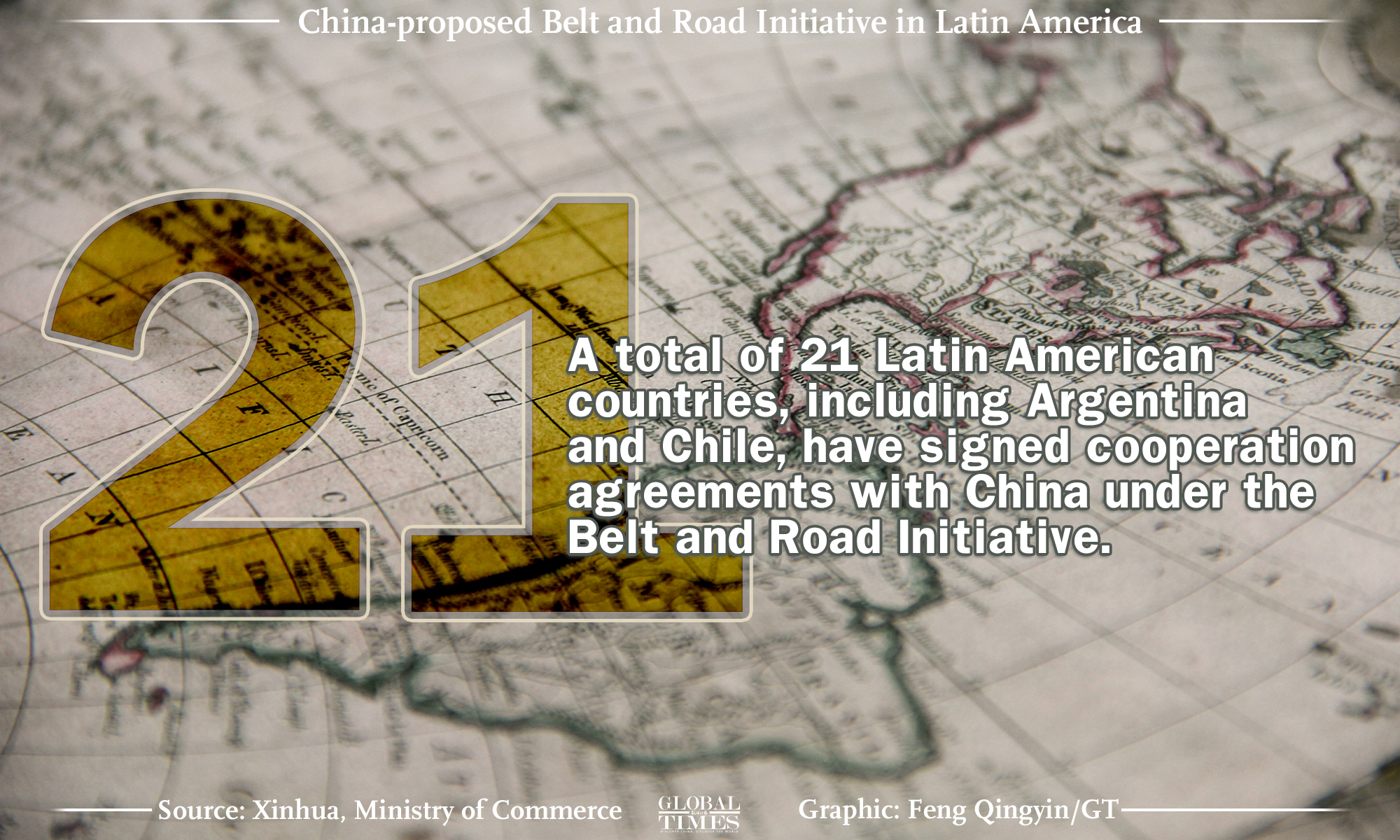
China-proposed Belt and Road Initiative in Latin America Graphic: Feng Qingyin/GT
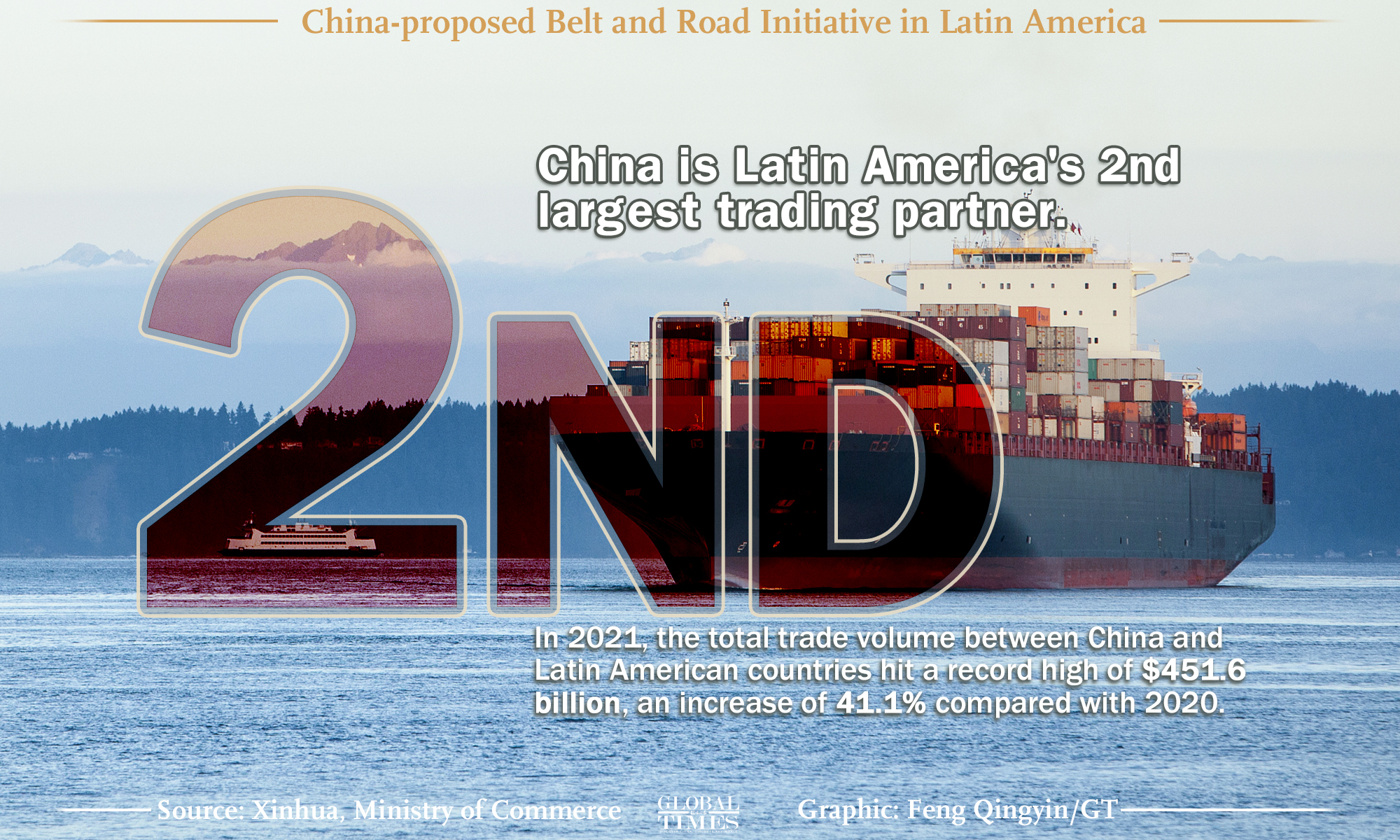
China-proposed Belt and Road Initiative in Latin America Graphic: Feng Qingyin/GT
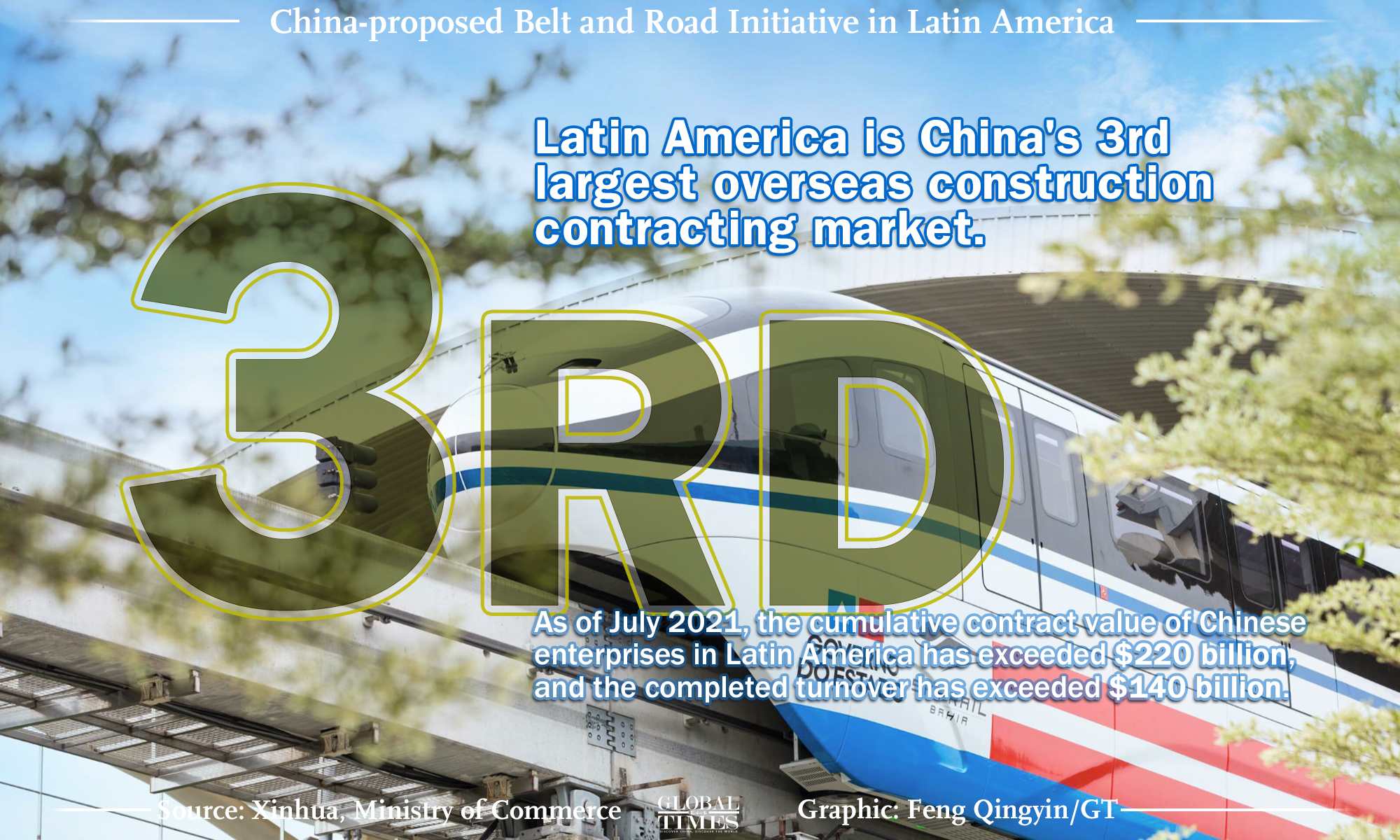
China-proposed Belt and Road Initiative in Latin America Graphic: Feng Qingyin/GT
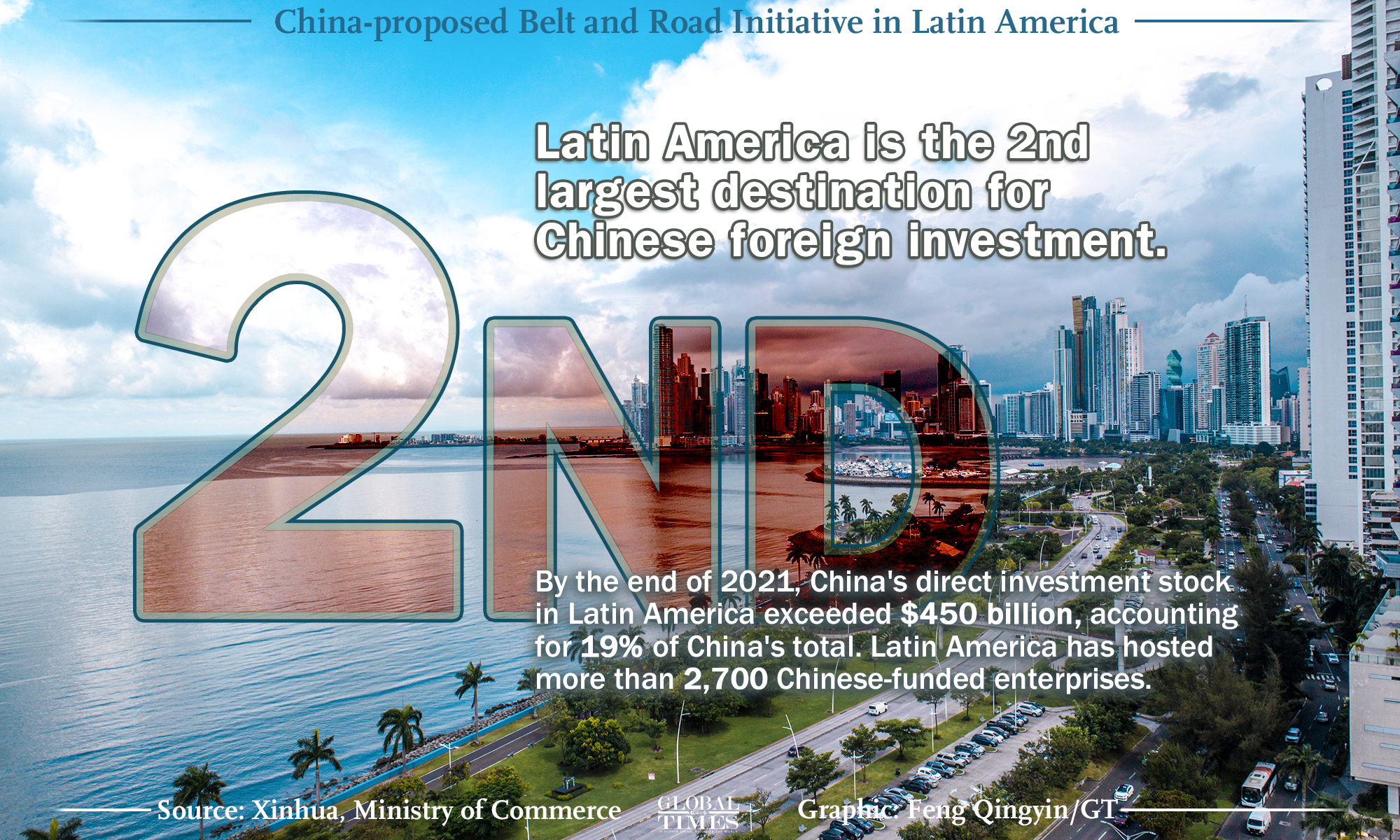
China-proposed Belt and Road Initiative in Latin America Graphic: Feng Qingyin/GT
